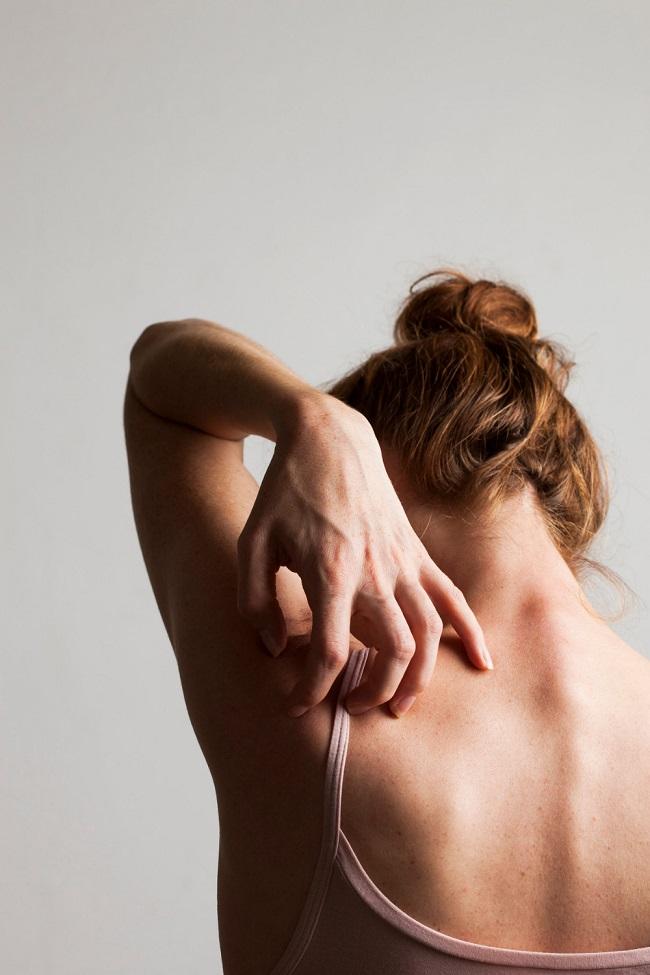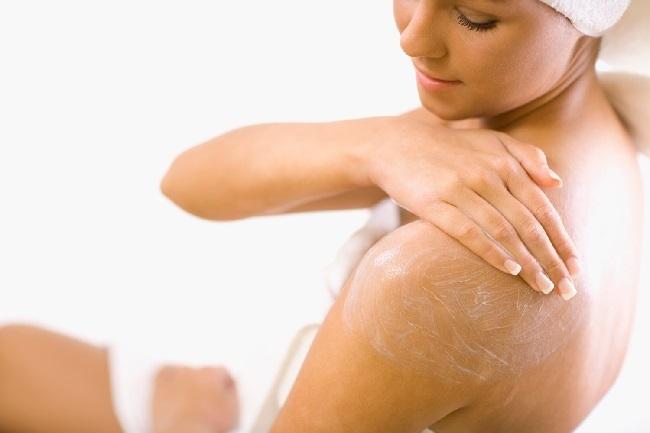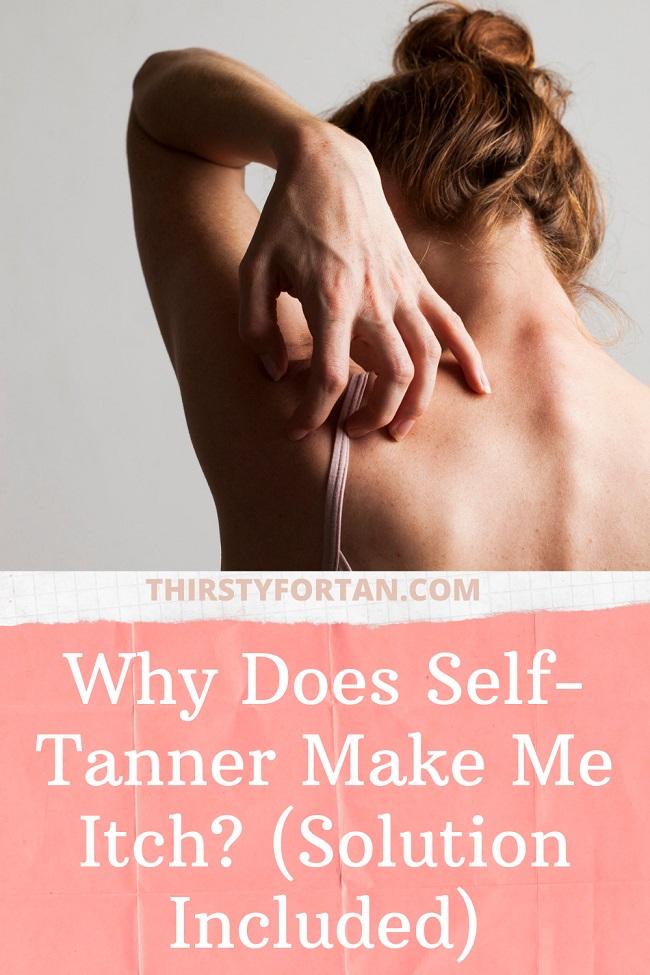As well as the undeniably enviable results you can yield from a self-tanning session, there are some points for self-tanners which can be a bit off-putting, such as them making you itch. If this is a problem you are experiencing, read on to find out what might be causing it.
Why does self-tanner make me itch?
If you have sensitive skin, you may be familiar with products feeling itchy or irritating after you’ve applied them, especially if they contain harsh ingredients, or ones which are known to flare up your skin. However, itchy self-tanner is something which can happen to anyone, sensitive skin or not, and it’s an awfully frustrating situation to be in. Thankfully, there is an explanation for this, and it’s completely normal – you’re not alone!
As mentioned, the main reason for self-tanner making a person itch is usually as a result of sensitive skin. Certain ingredients or chemicals present in the self-tanner to darken the skin or preserve the formula can cause irritation, especially if they’re known to be harsher or react with the skin in a certain way.
Often, those who don’t have sensitive skin can suffer from itchiness, too, so that’s not the only cause. Sometimes, those who don’t have sensitive skin can still have a mild allergy to certain chemicals or ingredients in the formula so their skin may flare up from this, too. There are things you can do to help with this, so read on to find out what they are, and how to prevent itchiness in the future.
The chemical in self-tanners which gives them the pigment is called DHA, and its job is to come into contact with the skin to produce a chemical reaction, which therefore produces the tan. Sometimes, this chemical reaction, though it’s completely safe, can also be a cause for itchiness.
Another reason why your skin is itchy when using self-tanner may also be due to unusual dryness or a lack of nourishment. While self-tanners themselves don’t actually dry out your skin, many people notice their dry skin more when they have a tan, and this can be a cause of itchiness, as it’s one of your body’s ways of telling you that it needs moisturisation.
Also read: How Does a Self-Tanner Work? (UV Protection, Safety, etc.)
What can I do if it’s itchy?
Luckily, there are a variety of solutions for the problem of itchiness with a self-tanner. If you manage to determine what your problem is from those above, that may also make it even easier to treat, but it’s not a problem if you can’t – you can always try out different things and use the process of elimination to determine what’s not your problem.
If you are looking for some fixes, here are the solutions to the most common problems when it comes to self-tanning:
- Moisturise: moisturising your skin whilst you’ve got a tan on can prevent itchiness, which can be caused when your skin dries out too much, and also prevents extreme fade. To maintain your self-tan, your skin needs to have moisture, so moisturising it with a body lotion or a similar product every day can prevent many different problems.
- Patch test: performing a patch test before you try out any new self-tanner can save you from having a very itchy body. To find out how to do this, look at ‘testing out a new self-tanner’ for instructions.
- Use a self-tanner for sensitive skin: if you have sensitive skin, you can always find a product which is designed to care for it at the same time. Some self-tanners may not be made specifically for sensitive skin, but they may be recommended for those with this, nevertheless.
Testing out a new self-tanner
Testing out a new self-tanner can be a little bit risky for a whole host of reasons, and itchiness or irritation is one of them. Especially if you have sensitive skin, you may feel very cautious about trying a new self-tanner as an alternative to your usual.
If this is you, and you want to try out a new self-tanner, you’ll be delighted to hear there is a way you can do this, it just requires a little bit of thinking in advance. Doing a patch test (a.k.a. trying out the product on a small, less noticeable area of your body) on somewhere like your foot can determine whether or not your new self-tanner will be suitable for your skin. Do this a few days in advance to give the product time to develop, and, if there is no irritation, you should be good to go!
- FLAWLESS SELF TANNER: This dark self-tanner creates a flawless, quick tan with gradual, natural-looking color for gorgeous skin and blended color
- DEEP SUNLESS TANNING: Lightweight, airy tanning mousse enhances your natural skin tone to mimic results from the sun.Cruelty free.Paraben free
- Bondi Sands Self Tanning Foam is a lightweight, tanner that’s simple to apply and gives a flawless finish, every time; Simply smooth on the weightless self tanning foam for an even, streak-free, bronzed tan
- Our unique, salon quality formula is enriched with aloe vera and coconut, for the ultimate natural, bronzed glow
- DARKEST POSSIBLE RESULTS. i'm perfect for when dark just isn't dark enough
- EASY TANNING. no gimmicks, no fake tan smell just the most awesome, dark tan on the planet
If you click Buy on Amazon and make a purchase, I'll earn a small commission at no additional cost to you.
Should I try a spray tan instead?
If you find that self-tanner causes problems for you, it can be easy to quickly jump straight to an alternative conclusion, especially one which eliminates the actually self-tanner completely. Spray tanning is another sun-safe option when it comes to achieving your dream summer skin goals, so it may be something worth considering. If you are thinking of trying a spray tan instead, you should way up the pros and cons first, to make sure that it’s the right choice for you.
Advantages of a spray tan:
- A professional spray tan can look neater, and streak-free
- Spray tans generally looks smoother and more natural
- You can go to a salon for the pamper experience
- Like self-tanner, spray tan doesn’t damage your skin
- Some spray tans can be better for sensitive skin (but not all are!)
- Sometimes a spray tan can last longer
Disadvantages of a spray tan:
- The initial cost, if you are buying a machine of your own, is high
- Visiting a professional in a salon can be quite expensive
- Getting out the equipment and setting everything up in your home each time you spray tan can be frustrating
- You need to learn how to use a spray tan gun if you’re doing it yourself
- You need to book appointments and arrive at the right time if you go to a salon
Can I moisturise my skin before applying a self-tanner?
As, for some people, their dry skin may be causing itchiness, isn’t using a moisturiser the best way to prevent this in the future? Using a moisturiser before your self-tanner application may help to start as you mean to go on – without any itchiness, dryness, or irritation.
Sure, this idea sounds great and very practical in theory, but there are some things which make it something which doesn’t work very well, too. As you’re about to find out, using a moisturiser straight before you apply your self-tanner isn’t a great idea, and it’s definitely not your best option.
When you use a moisturiser, or any other types of cream on your skin, they often create a very thin ‘barrier’ between your skin and the surroundings, as they are meant to trap in any moisture. The problem is that this barrier that is created can sometimes cause the self-tanner to apply quite slippery and messy, leaving streaks and patchiness in certain areas, as well as sometimes not allowing all of the tan to properly absorb.
However, you can use a little moisturiser in the extremely dry areas, such as your knees or elbows, before application of the tan, as these areas will still be able to soak up the self-tanner. For the rest of your body, you can apply a moisturiser after you have rinsed off the guide colour, after it’s developed.
Final thoughts
If your self-tanner is itchy, the main problem is usually sensitive skin, but there are other reasons this may be, and there are plenty of things you can do to help this. Hopefully, this article has answered all your questions concerning self-tanner and its itchiness, so you can go away and tan in confidence!







